Related Research Articles

Cyril M. Kornbluth was an American science fiction author and a member of the Futurians. He used a variety of pen-names, including Cecil Corwin, S. D. Gottesman, Edward J. Bellin, Kenneth Falconer, Walter C. Davies, Simon Eisner, Jordan Park, Arthur Cooke, Paul Dennis Lavond, and Scott Mariner.
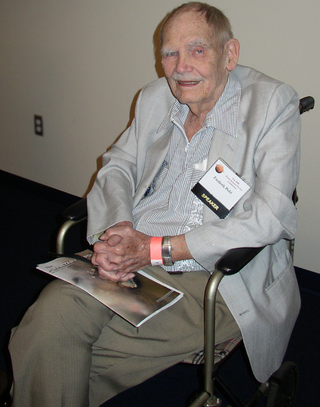
Frederik George Pohl Jr. was an American science-fiction writer, editor, and fan, with a career spanning nearly 75 years—from his first published work, the 1937 poem "Elegy to a Dead Satellite: Luna", to the 2011 novel All the Lives He Led.

Robert Norton Noyce, nicknamed "the Mayor of Silicon Valley", was an American physicist and entrepreneur who co-founded Fairchild Semiconductor in 1957 and Intel Corporation in 1968. He was also credited with the realization of the first monolithic integrated circuit or microchip, which fueled the personal computer revolution and gave Silicon Valley its name.
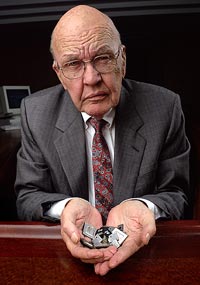
Jack St. Clair Kilby was an American electrical engineer who took part, along with Robert Noyce of Fairchild Semiconductor, in the realization of the first integrated circuit while working at Texas Instruments (TI) in 1958. He was awarded the Nobel Prize in Physics on 10 December 2000.
The Heechee Saga, also known as the Gateway series, is a series of science fiction novels and short stories by Frederik Pohl. The Heechee are an advanced alien race that visited the Solar System hundreds of millennia ago and then mysteriously disappeared. They left behind bases containing artifacts, including working starships, which are discovered and exploited by humanity.
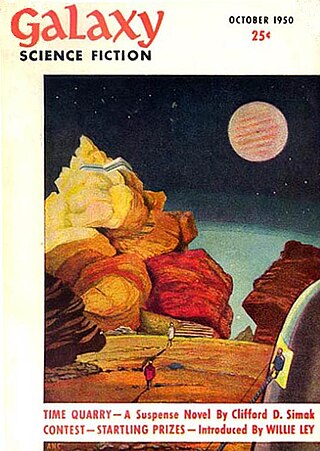
Galaxy Science Fiction was an American digest-size science fiction magazine, published in Boston from 1950 to 1980. It was founded by a French-Italian company, World Editions, which was looking to break into the American market. World Editions hired as editor H. L. Gold, who rapidly made Galaxy the leading science fiction magazine of its time, focusing on stories about social issues rather than technology.
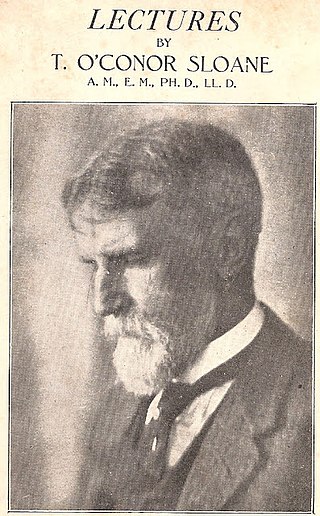
Thomas O'Conor Sloane was an American scientist, inventor, author, editor, educator, and linguist, perhaps best known for writing The Standard Electrical Dictionary and as the editor of Scientific American, from 1886 to 1896 and the first science fiction magazine, Amazing Stories, from 1929 to 1938.

A mixed-signal integrated circuit is any integrated circuit that has both analog circuits and digital circuits on a single semiconductor die. Their usage has grown dramatically with the increased use of cell phones, telecommunications, portable electronics, and automobiles with electronics and digital sensors.

The Skylark of Space is a science fiction novel by American writer Edward E. "Doc" Smith, written between 1915 and 1921 while Smith was working on his doctorate. Though the original idea for the novel was Smith's, he co-wrote the first part of the novel with Lee Hawkins Garby, the wife of his college classmate and later neighbor Carl Garby. The novel starts as an edisonade, but turns into a space travel adventure when the characters go into deep space. The Skylark of Space is considered to be one of the earliest novels of interstellar travel and the first example of space opera. Originally serialized in 1928 in the magazine Amazing Stories, it was first published in book form in 1946 by the Buffalo Book Co. The novel was followed by three sequels, beginning with Skylark Three.
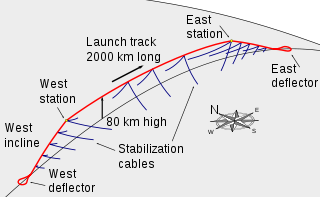
A launch loop, or Lofstrom loop, is a proposed system for launching objects into orbit using a moving cable-like system situated inside a sheath attached to the Earth at two ends and suspended above the atmosphere in the middle. The design concept was published by Keith Lofstrom and describes an active structure maglev cable transport system that would be around 2,000 km (1,240 mi) long and maintained at an altitude of up to 80 km (50 mi). A launch loop would be held up at this altitude by the momentum of a belt that circulates around the structure. This circulation, in effect, transfers the weight of the structure onto a pair of magnetic bearings, one at each end, which support it.

The Saga of Cuckoo is a series of science fiction novels by American writers Frederik Pohl and Jack Williamson. It consists of two novels, Farthest Star and Wall Around a Star.

The Space Merchants is a 1952 science fiction novel by American writers Frederik Pohl and Cyril M. Kornbluth. Originally published in Galaxy Science Fiction magazine as a serial entitled Gravy Planet, the novel was first published as a single volume in 1953, and has sold heavily since. It deals satirically with a hyper-developed consumerism, seen through the eyes of an advertising executive. In 1984, Pohl published a sequel, The Merchants' War. In 2012, it was included in the Library of America omnibus American Science Fiction: Four Classic Novels 1953–1956. Pohl revised the original novel in 2011 with added material and more contemporary references.

Turn Left at Thursday (ISBN 0-345-21747-0) is a collection of science fiction short stories by American writer Frederik Pohl, published by Ballantine Books in 1961.

The Abominable Earthman is a collection of science fiction stories by American writer Frederik Pohl, first published by Ballantine Books in 1963.
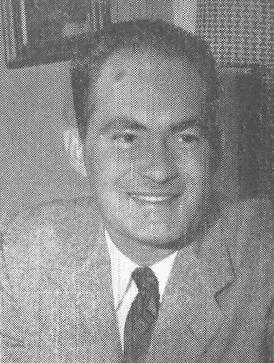
Richard Wilson was an American science fiction writer and fan. He was a member of the Futurians, and was married for a time to Leslie Perri, who had also been a Futurian.
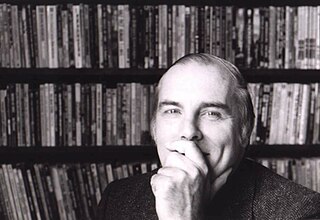
Howard Keith Henson is an American electrical engineer and writer. Henson writes on subjects including space engineering, space law, memetics, cryonics, evolutionary psychology, and the physical limitations of Transhumanism. In 1975, Henson founded the L5 Society with his then-wife Carolyn Meinel to promote space colonization. In 1987 the L5 Society merged with the National Space Institute to form the National Space Society.

Worlds of Tomorrow was an American science fiction magazine published from 1963 to 1967, at which point it was merged into If. The first issue appeared in April 1963. The last issue was published in May 1967. The publishers were Barmaray Co, New York City, and then Galaxy Publishing. It briefly resumed publication from Summer 1970 to Spring 1971, producing three issues. The magazine was edited in its first period of publication by Frederik Pohl, who was editor of Galaxy Publishing Co. from 1960-1969, and by Ejler Jakobsson in the second. It has published fiction by such noted authors as Arthur C. Clarke, Larry Niven, Fritz Leiber, Philip K. Dick, Brian W. Aldiss, Jack Williamson and Philip José Farmer. Pohl stated in 1967 that the magazine showed a loss of $15,000 during its first incarnation.

Amazing Stories Annual was a pulp magazine which published a single issue in July 1927. It was edited by Hugo Gernsback, and featured the first publication of The Master Mind of Mars, by Edgar Rice Burroughs, which had been rejected by several other magazines, perhaps because the plot included a satire on religious fundamentalism. The other stories in Amazing Stories Annual were reprints, including two stories by A. Merritt, and one by H.G. Wells. The magazine sold out, and its success led Gernsback to launch Amazing Stories Quarterly the following year.

Black Star Rising, published in 1986, is a dystopian science fiction novel by American author Frederik Pohl. It is about a post-nuclear war future in which a conquered United States becomes a Chinese farming colony. The main character is an American who the Chinese send to meet a race of warlike aliens who come to Earth.

"The Gold at the Starbow's End" is a science fiction novella by American writer Frederik Pohl. Originally published in the March 1972 issue of Analog Science Fiction/Science Fact, it was nominated for both the 1973 Hugo Award for Best Novella and the 1973 Nebula Award for Best Novella. It did win the 1973 Locus Award for Best Novella.
References
- 1 2 Chana Phaedra (2012). "Alcor Member Profile: Keith Lofstrom". Cryonics. Retrieved May 17, 2024.
- ↑ Lofstrom, Keith (1975). Sinusoidal supply Josephson logic (Master's thesis). U.C. Berkeley.
- ↑ Lofstrom, Keith H. (8–10 July 1985). "The launch loop -- a low cost Earth-to-high orbit launch system - Paper 85-1368" (PDF). Monterey, CA: 21st AIAA, SAE, ASME, and ASEE, Joint Propulsion Conference.
{{cite journal}}: Cite journal requires|journal=(help) - ↑ Radley, Charles (September 14, 2009). "Local inventor says launch loop would greatly reduce cost of space travel". Gadgets and Tech: Portland Science Examiner. San Francisco: Examiner.com.
- ↑ Alexander Bolonkin [in Russian] (2006). "8". In Badescu, Viorel; Cathcart, Richard Brook; Schuiling, Roelof D. (eds.). Space Towers. Macro-engineering: a challenge for the future. Springer. pp. 146–7. ISBN 1-4020-3739-2.
- ↑ Pohl, Frederik (1983). "Gateway III — Beyond the Gate (Part 1 of 3)". Amazing Science-Fiction . 57. Ultimate Pub. Co: 80.
- ↑ Pohl, Frederik (1983). Heechee Rendezvous . Vol. 3. Ballantine Books. p. 91. ISBN 0-345-30062-9.
{{cite book}}:|work=ignored (help) - ↑ Clarke, Arthur C.; Pohl, Frederik (February 2009). The Last Theorem . London: HarperVoyager. p. 55. ISBN 978-0-00-729002-4.
- ↑ Forward, Robert L. (1985). Starquake . London: Ballantine. p. v. ISBN 978-0-345-28349-8.
- ↑ "Interview with Frederik Pohl". Amazing Science-Fiction . 69 (590). Ultimate Pub. Co: 98. 1995.
- ↑ IEEE International Test Conference Proceedings. 1997. p. 8. ISBN 0-7803-4210-0.
- ↑ US 6161213, Lofstrom, Keith,"System for providing an integrated circuit with a unique identification",published Dec 12, 2000,issued Dec 12, 2000
- ↑ "A unique, repeatable, individual digital ID". Nov 30, 2007. Retrieved 2011-07-24.
- ↑ Lofstrom, K.; Daasch, W.; Taylor, D. "IC Identification Circuit using Device Mismatch" (PDF). 2000 IEEE International Solid-State Circuits Conference Digest of Technical Papers. 43. IEEE Cat. No. OOCH37056. Retrieved 2011-07-24.
- ↑ Lofstrom, Keith (Winter 2010). "Server Sky - Data Centers in Orbit". Online Journal of Space Communication (16).